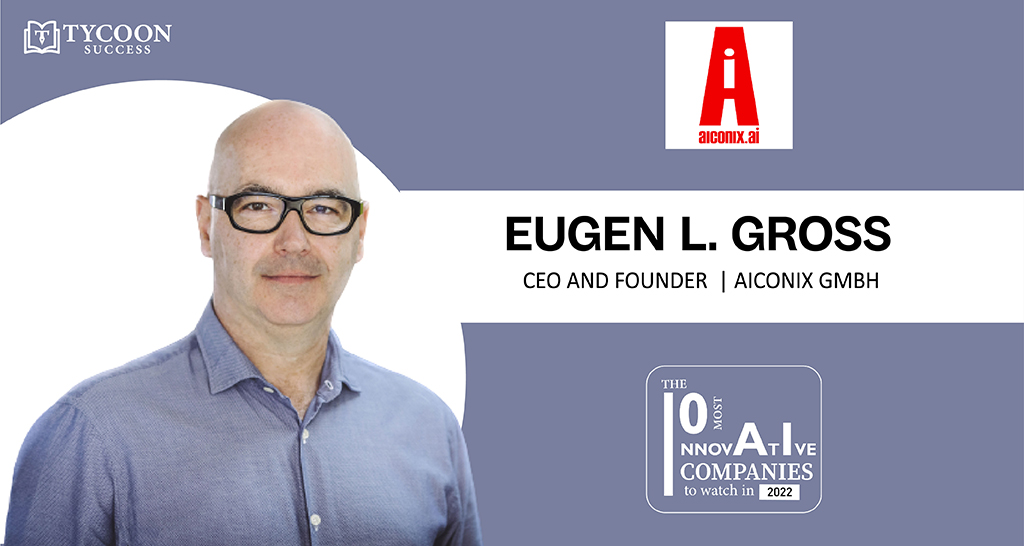Artificial Intelligence or AI is a term that describes a machine’s learning, reasoning, logic, creativity, and perception, which were once thought of as unique to humans but now replicated by machines and is used in every industry.
AI is a game-changer in all industries. Nowadays, the amount of data that is generated, by both humans and machines, far outpace humans’ ability to absorb, interpret, and make complex decisions based on that data. Artificial intelligence forms the basis for all machine learning and is the future of all complex decision-making. Today AI technology offers several critical benefits that make it an excellent tool for any modern organization. That’s not all, AI also allows organizations to make better-informed decisions, thus improving businesses by quite a few folds by increasing the speed and accuracy of decision-making processes.
It was on April 2018, when Eugen L. Gross, Co-founded aiconix, which enables its customers to enrich their audiovisual content to make it detectable, searchable, and usable.
aiconix currently offers B2B solutions that aim to improve productivity by providing customers simple and immediate access to the recent AI innovations.
An Creative Turned Entrepreneur
aiconix’s Co-founder and CEO, Eugen L. Gross, started his career as a camera assistant in Vienna and quickly became a cameraman for news when he moved to Berlin. In the 90s Eugen worked as an SNG operator and technical lead of an OB-van. But he was drawn back to the camera, shooting mainly live music and entertainment productions for TV. In the 2000s he became a partner of a TV production company in Cologne and produced a beautiful but very unsuccessful long-term documentary in Northern Germany where Eugen was a shareholder. In early 2010 he also worked as a producer and director before pursuing a master’s degree in media management and set the course for aiconix in 2016 with his master’s thesis.
Path Breaking Offerings
In an automated process, aiconix can enrich audio-visual content with metadata. Also with the auto-cataloging process, the search in the media archive according to certain parameters is very easy. With AI features such as face recognition, object localizer, or person tracking, one can search and process the AV content in many ways.
The organization also offers several speech-to-text solutions such as the automated transcription and subtitling of any audio or video file and live-video streams, which is important for companies who want to reach those who are deaf or hearing impaired and also help non-native speakers to better understand the content.
Additionally, as a part of the STADIEM acceleration program aiconix has set itself the goal of improving the automated recognition of Austrian dialects in audio-visual media. For this purpose, aiconix is training a language model that specializes in the recognition of Austrian dialects. The focus of the project is on the recognition of “Wiener-Standard-Deutsch” (Viennese Standard German), followed by other Austrian dialects, and the recognition of other dialects within Europe. This project has indirectly received funding from the European Commission’s Horizon 2020 Framework Programme through the STADIEM project (Grant Agreement 957321).
aiconix’s customers are mainly media companies and digital asset management or content management software companies, but in general, all owners of the high volume of media content are potential customers such as educational institutions, Government, Healthcare providers, or Insurance companies.
A Life Changing Technology
As we all know AI is a game-changer in all industries. Nowadays the amount of generated data outpaces our ability to absorb, interpret, and make complex decisions based on that data. Artificial intelligence forms the basis for all machine learning and aiconix believes, it is the future of all complex decision-making.
AI technology offers several critical benefits that make it an excellent tool for any modern organization. Just a few examples: AI can automate a repetitive task that was previously done manually, it can make products and services smarter and more effective.
Additionally, this technology can also analyze data at a much faster rate than humans, allowing it to find patterns much more quickly, and to uncover patterns humans would simply miss. Simply put, Artificial Intelligence allows organizations to make better decisions, improving business processes by increasing the speed and the accuracy of decision-making processes.
Protecting Data and Privacy
When it comes to upcoming trends of AI, data privacy and ethics are the top focus. According to the organization, Multimodal models and federated learning are the next big things and will again speed up the possibilities it has. Multimodal AI is the ultimate convergence of computer vision and conversational AI models to deliver powerful scenarios closer to human perception. It takes AI inference to the next level, combining visual and speech modalities.
In machine learning, usually data that is aggregated from several devices and is brought together to a centralized server. Machine Learning algorithms, then grab this data and train and finally predicts results for new data generated. But this could become a “privacy nightmare”. The solution could be federated learning, which is a method of machine learning that enables individual devices to learn together using a common model. It enables the individual training of models on different, isolated data sets. Only these trained models, which no longer contain personal data, are then shared with each other. The devices send their respective models to a central server, which creates a single, combined model from them.
Preparing for a Bright Future
As an AI company, aiconix want to play a pivotal role in its market and strive for long-term customer relationships. The organization is agile and able to cope with the changes brought and driven by external factors. But most importantly, aiconix is always trying to drive change instead of responding to change. The organization’s goal is to bring (AI) solutions to the market and create a demand for it by relating its utility to the daily work of its customers. Therefore, the best way to become future-ready is to create the future.

